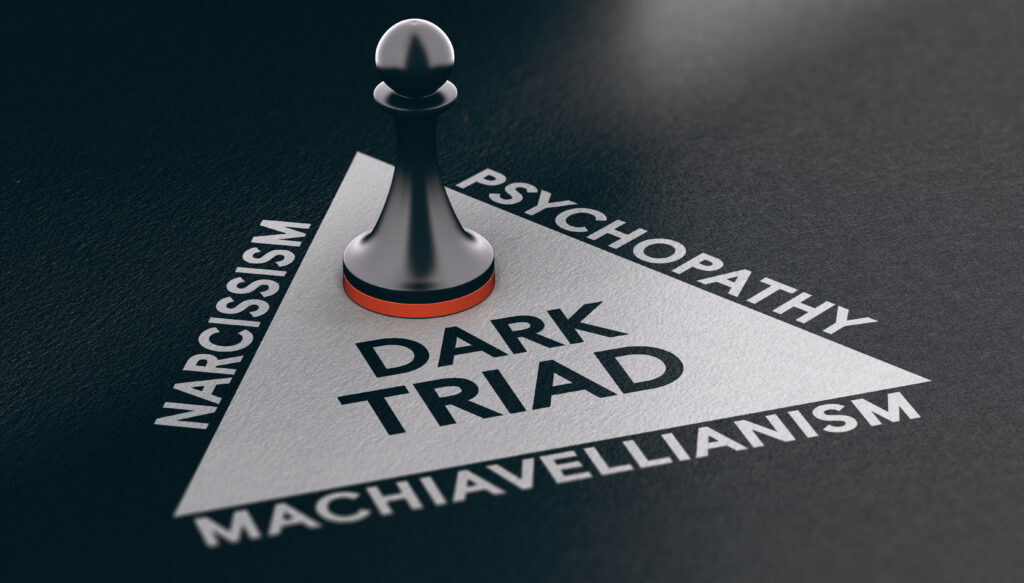“Individuals high on the dark triad traits appear to exhibit an empathic profile that allows them to retain their ability to read and assess others’ emotions, and subsequently utilize this sensitive information to formulate strategies with which they can acquire what they want, while their lack of affective empathy may lead them to overlook or ignore potential harm inflicted to others in the process.” – Michael Wai, Niko Tiliopoulos.
As a business leader, keeping your workforce safe should be a top priority. But in some cases, it is challenging to identify potential risks and prevent them from causing harm. The Dark Triad—comprising psychological traits such as narcissism, Machiavellianism, and psychopathy—is an often overlooked factor in workplace safety. By understanding the signs of these traits and instituting proactive strategies for dealing with them, you can help protect your employees from unnecessary stress and disruption. Read on to understand what makes up the Dark Triad and tips for addressing any suspicions regarding its presence within your workforce.
What are the Dark Triad traits?
“The dark triad comprises three personality traits: narcissism, Machiavellianism, and psychopathy. They all have a malevolent connection: if you have traits of one, you’re likely to share traits with the others. Narcissists have no empathy whatsoever, in addition to thinking they are more special than everyone else. Machiavellianism is all about manipulation and the exploitation of others, displaying a total lack of morality as the individual focuses on their own self-interest, and psychopaths are completely remorseless as they pursue their antisocial behaviour.” – Lucy Dawson.
The dark triad is a psychological theory of personality, first published in 2002, that describes three notably toxic but non-pathological personality types: Machiavellianism, subclinical narcissism, and sub-clinical psychopathy. Dark Triad personality traits can be toxic and harmful in the workplace. Moreover, employees or managers exhibiting these traits may initially be high performers and potentially charming, conscientious, and achievement-oriented; making it hard to identify them.
Narcissism in Organizations
“Narcissistic personality disorder is named for Narcissus, from Greek mythology, who fell in love with his own reflection. Freud used the term to describe persons who were self-absorbed, and psychoanalysts have focused on the narcissist’s need to bolster his or her self-esteem through grandiose fantasy, exaggerated ambition, exhibitionism, and feelings of entitlement.” – Donald W. Black.
Narcissists are masters at making first impressions and thus can establish positive short-term relationships. However, over time, they will display an inflated sense of self-importance, a lack of empathy, and a need to be the center of attention. These traits by themselves are relatively harmless. Moreover, at some point in their lives, narcissists become aware that their behavior negatively impacts friends, family members, peers, and coworkers. Even so, they are indifferent to it due to their inability to empathize.
Signs of Narcissism Employees
- Sense of entitlement
- Belief in their superiority
- Manipulative behavior
- Attention-seeking
- Lack of Empathy
- No close friends
Narcissistic employees are self-absorbed and validation-seeking. In the workplace, they can make others unhappy, leading those employees to leave their jobs out of self-preservation voluntarily. Generally, employees exposed to narcissistic treatment by peers are unable or unwilling to articulate the problem to HR or managers and will eventually leave their jobs rather than work with the narcissist.
Machiavellianism in Organizations
“The universe runs on the principle that one who can exert the most evil on other creatures runs the show.” – Bangambiki Habyarimana.
Individuals with Machiavellian psychological dispositions tend to display arrogance and consider themselves superior to those around them. In organizations, Machiavellians are characterized as cunning, deceptive, distrustful, and strategically manipulative. In addition, they tend to openly express cynicism, sarcasm, and callousness in pursuing money, power, promotions, and ambition. Thus, Machiavellians are predisposed to engaging in unethical and organizationally undesirable behaviors.
Signs of Machiavellianism
- Active manipulation of people, circumstances and group dynamics (the signature trait of Machiavellianism)
- Doing whatever is necessary to accumulate power
- Proactively attempting to control or minimize the influence of coworkers
- Intentionally withholding information from colleagues
- Using manipulation to achieve strategic goals
- Scheming for personal benefit regardless of consequences
Psychopathy in Organizations
“He will choose you, disarm you with his words, and control you with his presence. He will delight you with his wit and his plans. He will show you a good time, but you will always get the bill. He will smile and deceive you, and he will scare you with his eyes. And when he is through with you, and he will be through with you, he will desert you and take with him your innocence and your pride. You will be left much sadder but not a lot wiser, and for a long time, you will wonder what happened and what you did wrong. And if another of his kind comes knocking on your door, will you open it?” – Robert D. Hare.
Psychopaths exhibit an extreme lack of empathy toward others. They can also express manipulative and charming personality traits to gain the confidence of bosses and colleagues. In organizations, psychopaths can be exploitative and impulsive as well as engage in risky behaviors. However, they likely do not experience guilt and, as such, will refuse to be accountable for their actions.
Signs of Psychopathy
- Compete rather than cooperate with coworkers and peers
- Do not consider the consequences of their decisions
- Make risky decisions despite organizational rules or ethics
- Openly question authority, rules, and the status quo
- Prefer bullying or criticizing “the coworkers” versus “the tasks.”
Psychopathic business leaders desire totalitarian power and control over their employees. Hence, they prefer to work in the upper management level of organizations. High-level managerial positions facilitate their ability to exercise control over the greatest number of people.
What are the costs to organizations of the Dark Triad?
Individuals who are high in dark triad traits take pleasure in seeing others suffer; the suffering feeds their sense of superiority and desire for power and control. Understandably, employees will feel uncomfortable working alongside these malevolent coworkers. At the same time staff will find it difficult to express why they are uncomfortable in a way that company leaders will comprehend. Further compounding the problem, employees with dark triad traits may be widely perceived by management and peers, who do not work directly with them, as high performing, charming employees. This personality front and manipulation of people and circumstances will lead to a toxic work environment comprised of high levels of job stress, lower levels of job satisfaction, and voluntary turnover.
Tips on How Employees Can Protect Themselves from The Dark Triad
-
- Surround yourself with supportive people
- Do not allow yourself to be isolated from colleagues
- If you feel isolated, seek the help of a psychotherapist
- Keep your personal and work life organized
- Learn how to say “no” and set boundaries
- Do not allow disrespectful treatment to go unchecked
The Dark Triad should not be taken lightly by business leaders. It can create a toxic work environment and lead to disruptive behaviors that cause undue harm to both employers and employees. However, by heeding warning signs, taking proactive steps to address suspected psychopathy, narcissism, and Machiavellianism, as well as providing a safe working environment for all, you can safeguard your team from the dangers posed by the Dark Triad. With comprehensive policies, resources, protocols, and procedures in place, you can ensure the safety and well-being of your workforce while running a successful business. So remember: take the necessary precautions against the presence of the Dark Triad in your workplace and promote an atmosphere where everyone feels respected and cared for – it’s essential for optimal workplace productivity!
Thank you for reading our article!
TimeWellScheduled is a secure online time and attendance software that is 100% tailored to meet your scheduling needs! In addition, TimeWellScheduled facilitates employee attendance tracking & payroll tasks and enhances staff management capabilities. Plus, our service is free for up to 10 employees!
Click: here to download our (Excel) employee scheduling template; IT’S FREE!






